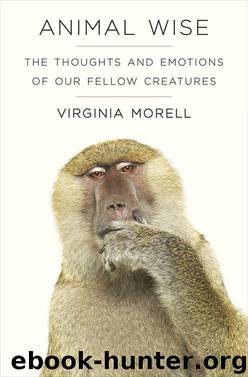Animal Wise: The Thoughts and Emotions of Our Fellow Creatures by Virginia Morell

Author:Virginia Morell
Language: eng
Format: mobi, epub
Tags: Zoology, Professional & Technical, Professional Science, Science & Math, Biological Sciences
ISBN: 9781863955966
Publisher: Black Inc.
Published: 2013-05-27T23:00:00+00:00
7
THE EDUCATED DOLPHIN
Man had always assumed that he was more intelligent than dolphins because he had achieved so much—the wheel, New York, wars, and so on—while all the dolphins had ever done was muck about in the water having a good time. But conversely, the dolphins had always believed that they were far more intelligent than man—for precisely the same reasons.
DOUGLAS ADAMS
It was the start of the dolphins’ day at the National Aquarium in Baltimore, Maryland, and five dolphins were lined up at the edge of a large pool. Their big, smooth heads poked out of the water, and they squeaked and clicked at their trainers, five young women dressed alike in blue T‑shirts and khaki shorts. Shiny buckets brimming with silvery fish sat next to the trainers’ feet. Like coaches, the trainers talked, signaled, and whistled to the dolphins, giving directions. When the dolphins did something right, the women cheered and tossed fish from the buckets into their charges’ clacking jaws.
One dolphin leaped in the air, her body arced as gracefully as a ballerina’s. Another did a tail stand and hopped backward over the pool’s blue surface, as if performing an aquatic version of the moonwalk dance step. A third one rolled onto her back close to the pool’s edge, exposing her genital and anal slit while her trainer kneeled down and, with a gloved hand and plastic scoop, took a fecal sample.
There were tail slaps, huge, spinning jumps, and even bigger splashes—all part of the dolphins’ exercise and training routine. I watched the proceedings with Diana Reiss, a comparative psychologist and animal cognition researcher from Hunter College in New York City. Reiss, a petite brunette with a warmly busy manner, was there to begin a new experiment with young dolphins. It was part of her research using mirror self-recognition (MSR) tests to upend old ideas about which animals are able to recognize their reflected images—a skill that scientists have long linked to self-awareness. Like the elephants in the Bronx Zoo, animals that pass the MSR test are thought to belong to an exclusive club, one whose members can think about themselves and their actions. (Reiss was a member of the team that tested the Bronx elephants for this ability.)
Gordon Gallup Jr., then a psychologist at Tulane University in New Orleans (and now at the State University of New York at Albany), invented the mirror test in 1970 after reading Darwin’s account of watching an orangutan, Jenny, at the London Zoo in 1838. Darwin noted that when the young ape saw her reflection in a mirror, she appeared to be “astonished beyond measure.” Although Gordon doubted that animals had minds, he wondered if Jenny had recognized herself in the mirror. He then came up with a method for testing apes for this ability and gave his exam to four chimpanzees, two young females and males, who all passed. Gallup, the previous animal-mind skeptic, concluded that the chimpanzees did understand who the chimpanzee in the mirror was; they realized that
Download
Animal Wise: The Thoughts and Emotions of Our Fellow Creatures by Virginia Morell.epub
This site does not store any files on its server. We only index and link to content provided by other sites. Please contact the content providers to delete copyright contents if any and email us, we'll remove relevant links or contents immediately.
Sapiens: A Brief History of Humankind by Yuval Noah Harari(14368)
The Tidewater Tales by John Barth(12651)
Mastermind: How to Think Like Sherlock Holmes by Maria Konnikova(7323)
Do No Harm Stories of Life, Death and Brain Surgery by Henry Marsh(6938)
The Thirst by Nesbo Jo(6932)
Why We Sleep: Unlocking the Power of Sleep and Dreams by Matthew Walker(6706)
Life 3.0: Being Human in the Age of Artificial Intelligence by Tegmark Max(5547)
Sapiens by Yuval Noah Harari(5366)
The Body: A Guide for Occupants by Bill Bryson(5080)
The Longevity Diet by Valter Longo(5058)
The Rules Do Not Apply by Ariel Levy(4957)
The Immortal Life of Henrietta Lacks by Rebecca Skloot(4576)
Animal Frequency by Melissa Alvarez(4461)
Why We Sleep by Matthew Walker(4434)
The Hacking of the American Mind by Robert H. Lustig(4375)
Yoga Anatomy by Kaminoff Leslie(4358)
All Creatures Great and Small by James Herriot(4311)
Double Down (Diary of a Wimpy Kid Book 11) by Jeff Kinney(4261)
Embedded Programming with Modern C++ Cookbook by Igor Viarheichyk(4173)
